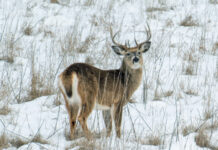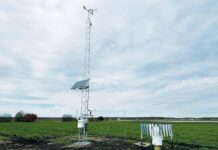URBANA, Ill. — At age 20, people may be in their physical prime, but for horses, 20 often marks the beginning of the golden years. Dr. Scott Austin, an equine veterinarian at the University of Illinois Veterinary Teaching Hospital in Urbana, says senior horses require special attention to ensure their comfort as they get older.
Aging horses
“Some of the major issues that we see as horses age are slowing down, weight management struggles, and weakened immunity,” says Dr. Austin, who is board certified in large animal internal medicine. He offered advice to owners at the annual Horseman’s Clinic, held in February at the College of Veterinary Medicine. As horses age, they tend to lose muscle mass for various reasons.
To address this problem and help keep them in better shape, Dr. Austin says older horses often require a “senior diet” that is highly palatable, digestible, and with an amino acid profile that maintains muscle mass.
Exercise
Much like people, older horses may become arthritic, which can make them less likely to want to walk and exercise. However, one of the worst things that a horse with arthritis can do is stand around. Movement and exercise are beneficial for maintaining joint health as well as for keeping weight down.
Monitor weight
Every geriatric horse should have yearly veterinary examination to monitor body weight, dental health, and screen for medical problems. Older horses may be in danger of becoming either overweight or underweight, depending on the circumstances. Weight tapes combined with body-condition scoring are tools that can be used to detect weight problems before they are serious.
According to Dr. Austin, pasture ponies often gain weight as they age because owners tend to show their love through food. “Geriatric horses that spend the majority of their time grazing in fields need a diet low in grain. Feeding grain when it is not needed or access to lush pasture can result in weight gain which is an important predisposing cause for laminitis and founder,” says Dr. Austin.
A veterinarian can advise owners on a weight loss treatment plan tailored to meet the needs of their heavy horse. A weight loss program for an ex-racehorse, for example, will take a different approach from a plan devised for a pasture pony.
Dental care
Horses of any age need dental care at least yearly, and in some cases more often. What many owners do not realize is that after horses reach 16 years of age, their teeth can begin to decline dramatically.
“Older horses often cannot grind their feed very well due to the deterioration of their teeth, which can cause a decrease in appetite,” says Dr. Austin. “Because these horses need to chew their food more, they are slower eaters. In large group feeding settings, these horses may be chased away from their food by younger individuals.”
If this occurs, owners should feed the older horses separately, allowing plenty of time for them to eat. Dr. Austin also recommends using feed that is already ground or cooked, since older horses can have difficulties absorbing nutrients from their food.
Immune health
Another problem in aging horses, as in aging people, is a weaker immune system. It is important to keep horses up to date on vaccines and deworming. “Older horses can also become more susceptible to metabolic diseases, such as pituitary pars intermedia dysfunction and kidney failure,” warns Dr. Austin.
Pituitary pars intermedia dysfunction (PPID) is also known by the name Cushing’s disease, although it is not the same as Cushing’s disease in people. Increased drinking and urination are classic signs of PPID and kidney failure. PPID also causes a potbelly, loss of muscle, and long hair that does not shed.
Healthy as a horse
The bottom line is that owners need to watch their geriatric horses closely for signs of decline and to take quick action to address problems. More frequent veterinary visits, along with attention to diet and exercise will help keep older horses comfortable in their golden years.











We have 3 senior horse right now and were giving a special attention to their health. Their immune system is low that’s why we feed them with food that is rich in essential minerals to maintain their health.